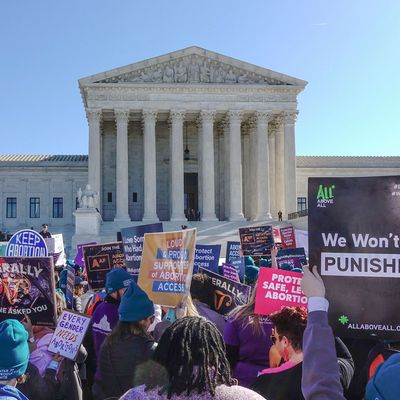
As spring turns to summer, the calendar is finally beginning to release us from the grip of the U.S. Supreme Court’s sadistic habit of saving its most consequential decisions for the end of the term. SCOTUS handed down two major decisions last week (one making it clear LGBTQ folks are protected by basic employment-discrimination laws, and another invalidating Trump’s effort to kill Obama’s DACA relief program for Dreamers). Remaining major cases involve issues ranging from Trump’s efforts to hide his financial records to the power of states to exclude religious schools from taxpayer-funded scholarship programs to yet another round of litigation over Obamacare’s contraception-coverage mandate.
But to those on both sides of an issue that has been fundamental to constitutional law and the culture wars since 1973, the case to wait for with bated breath is June Medical Services LLC v. Russo, which may be the most significant decision on abortion law to come down since the Court reaffirmed the right to choose in 1992’s Planned Parenthood v. Casey.
The case involves a classic TRAP (Targeted Regulation of Abortion Providers) law enacted by Louisiana that imposes all sorts of novel licensing requirements (e.g., requiring admitting privileges at local hospitals) on abortion clinics in the name of women’s safety and health. The law’s obvious purpose is to shut down clinics and make abortion rights extremely difficult to exercise. What makes this case most interesting is that Louisiana’s law is almost identical to a Texas law the Court struck down just four years ago in Whole Woman’s Health v. Hellerstedt as an “undue burden” (the standard set in Casey) on a woman’s right to an abortion. But that was a 5-3 decision when Neil Gorsuch and Brett Kavanaugh were not on the Court and Anthony Kennedy was (the vacancy created by Antonin Scalia’s death had not been filled at that point thanks to the Republican refusal to act on Obama’s appointment of Merrick Garland).
While SCOTUS can and does on occasion reverse its own prior holdings, it’s unusual for that to happen as quickly as it might in June Medical Services. And if it does, the Court would naturally raise suspicions that it’s just an appetizer before the eventual main course of reversing Casey and its landmark predecessor, Roe v. Wade altogether — as Donald Trump promised anti-abortion groups he’d make happen during his 2016 campaign.
But to be clear, even if the Court does not hasten the formal demise of the right to choose, if it gives the green light to Louisiana and Texas and other Republican-controlled states to devise the most pernicious and insincere TRAP laws imaginable, it will make abortion rights largely theoretical for many women by making the operation of clinics impractical. More indirectly, it would signal that the current Court’s interpretation of Casey’s “undue burden” standard placed so low a value on the right to abortion as to make it fall before even the most transparently bogus state claim of a health rationale for restrictions.
With the four liberals who voted with Kennedy to strike down Texas’s law still on the Court, while the conservative bloc of Justices Clarence Thomas and Samuel Alito has been augmented by Trump’s two appointees (Gorsuch and Kavanaugh), it is generally assumed that Chief Justice John Roberts will be the swing vote on this case. And it’s not easy to predict how he will come down. On the one hand, he was a dissenter in Hellerstedt. On the other, in that case he simply joined an Alito opinion that argued those seeking relief from the Texas law were barred on procedural grounds. And during the oral arguments over June Medical Services, as Vox’s Ian Millhiser noted at the time, Roberts appeared “uncomfortable” with Louisiana’s clumsy efforts to distinguish its TRAP law from that of Texas.
Roberts is also famously concerned that the Court avoid the appearance of becoming politicized. Abruptly reversing major precedents on the hottest of hot-button issues is not a good way to maintain the Court’s reputation for integrity.
The spot Roberts is in also increases the possibility that he will find some narrower basis for a decision that does not cut off all ground for retreat. If, for example, he seized upon Alito’s suggestion during oral arguments that clinics lack standing to vindicate the constitutional rights of individual women seeking abortions, he might give Louisiana a victory but punt the broader issues to a future proceeding after the November elections.
If the Court does come down squarely for or against Louisiana and TRAP laws, the political implications are massive. Pro-choice Americans would be on notice that the right to choose was hanging by a thread that could only be rewoven by a Biden victory — and perhaps a Democratic Senate, too — in November. Additionally, a green light to TRAP laws would become a bigger issue than ever in state-level politics, potentially mobilizing pro-choice voters to overturn Republican-controlled legislatures. On the other side of the barricades, Trumpian and Republican emissaries to conservative Evangelical and traditionalist Catholic constituencies could claim they were finally in the process of producing the rollback of abortion rights they have been promising for decades.
If, conversely, Roberts joins with the liberals to uphold Hellerstedt and invalidate TRAP laws a second time, the Trump/GOP marriage of convenience with the anti-abortion movement will come under unprecedented pressure. After the high heresy of Neil Gorsuch’s opinion upholding LGBTQ rights last week, another decision maintaining abortion rights would make cultural conservatives doubt they were getting much in return for their loyal support of the president and his party (much as they did in 1992 when the majority upholding the right to abortion in Casey was composed of five justices appointed by Republican presidents). Trump would argue with special urgency that he must have a second term in order to consolidate the conservative domination of the Supreme Court most observers thought had already been guaranteed in 2016.
For John Roberts, deciding the June Medical Services case in favor of abortion rights would consolidate the belief on the political right that he is simply a traitor, as earlier evidenced by his crucial 2015 vote to save Obamacare, his invalidation last year of a citizenship question on the 2020 Census, and just last week, his support for Gorsuch on LGBTQ rights. No wonder Roberts’s Court is putting off June Medical Services and other high-stakes decisions as long as it can.






























